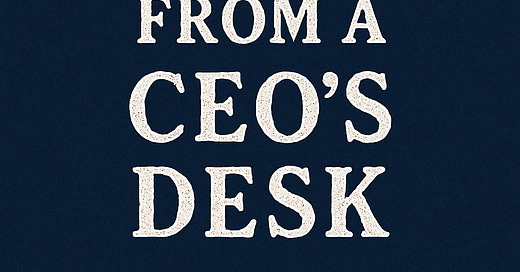How To Manage a Business when Weeks like This are the Norm
We're stuck in this Uncertainty Loop and have to manage through it. But it is absolutely doable - you might even emerge stronger. Yes, I mean that.
I haven’t spoken to one executive on either side of the Atlantic who isn’t scratching their heads. Never mind trying to find ways around (if possible) or ways to cope with the tariffs – it is the back and forth, the uncertainty, the unpredictability that is causing real headaches.
It is the reality that whatever big mitigating step you take right now, you can end up in an even worse situation later when the winds change.
You certainly cannot make a decision on where to build a factory based on the current US tariff framework – remember, a factory is not just for Easter...
Supply chains have become incredibly sophisticated over the past decades, with individual locations developing specific expertise. But even if you are not a manufacturer but sell goods into or from the US, the constant unpredictability can pose serious challenges.
Beyond the specific question of tariffs, even with the currently in place 90-day pause there is a strong probability of the US economy, and the world economy, heading into recession. This is not the newsletter to go into the exact consequences of this week’s market meltdowns but you’d have to be living under a rock (or an enviable fairytale existence) not to have heard about it.
Many of our readers are based in the UK, where businesses are also dealing with the impact of… okay, really, we are not trying to bring you all the economics and market news in Notes from the CEO’s Desk, rather we want to help you steer your business or career through these times of unpredictability.
Here’s a short video on some of the key steps you should consider.
Because let’s be real: this isn’t easy.
We are in times of perma-uncertainty - an Uncertainty Loop and we just have to keep managing through it.
Look, I get it.
You’re running a business because you want to build something great. You’ve got big goals, great products, plans to grow.
But then… all this happens and suddenly your plans, your P&L and cashflow projections don’t make sense. Hitting those targets that a few months ago seemed achievable might suddenly look way out. A well-tested market becomes extra hard to access and developing new markets requires investment and time. Talent might suddenly become unavailable – or there are many people but not with the right skill set.
Tariffs, market shocks, recession warnings. It’s a lot to take in. And it’s not just noise – these are real challenges. Challenges that keep shifting every week even.
But here’s the good news: you can navigate this. Businesses had survived the Great Recession and the pandemic shock. Many even thrived once they rejigged their business model and narrowed or readjusted their focus.
Here’s some things you should keep in mind.
1. Retrenchment is not always the right answer.
It might feel like the natural move when things get tough, but it’s best to take a deep breath first and look at the broader picture. This isn’t a full-scale global slowdown. It’s an uncertain, shifting environment. And that means opportunities still exist.
2. Scenario planning is your friend.
If you didn’t get into scenario planning over the past five years, now’s the time. It’s not about predicting the future and it is not a magic bullet – it is about being ready for whatever comes. It is about being prepared, mentally and resource-wise, to take action fast.
3. Check your cost base and discretionary spending.
Having said all that about not retrenching, a thorough review of your cost base is important. You’d be surprised how much is being spent without good reason. Old contracts that no one ever cancelled. Duplicated services. There’s always a lot to clean up. It is the first obvious place we look at when working on transforming a business.
4. Look at skill sets, not job titles.
There’s hidden talent in your team. Redeploy, repurpose, rethink roles. And to be able to do that you need to take stock. You might be sitting on more capability than you realise, skills that can be deployed in more places. Do this, before you look at reducing the workforce, especially if you have to put in place a hiring freeze.
5. Explore new markets.
Don’t get stuck in the same place, desperately trying to mould your offering into a shape that doesn’t fit your margins. Whether it’s a new international market or a new market segment at home, this is the time to look – there are opportunities out there. And the answer is often not price reduction or mass markets. You have to be even more intentional in your targeting.
The bottom line is, you can’t afford to and shouldn’t panic. Every leader faces moments like this if you are around long enough.
Remember, it is easy to build a business when times are easy and the economy is booming. It is in uncertain times like these that great leaders are forged.
You’ve got this.
Before I continue, just for fun here’s how Gemini interpreted this newsletter:
Far from perfect, but we’ve come a long way from 7 mushy fingers.
We’ve hardly recovered from the uncertainty unleashed by





